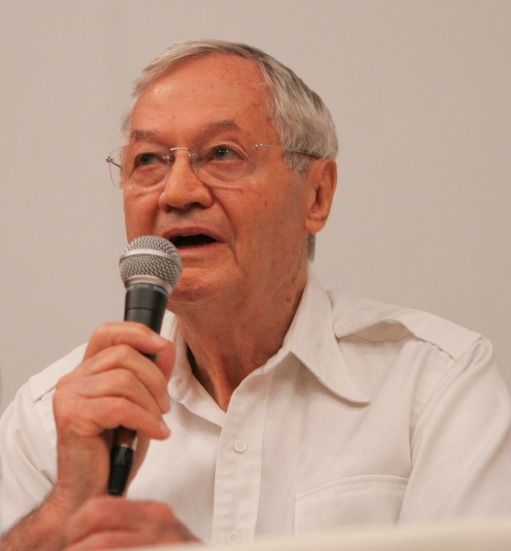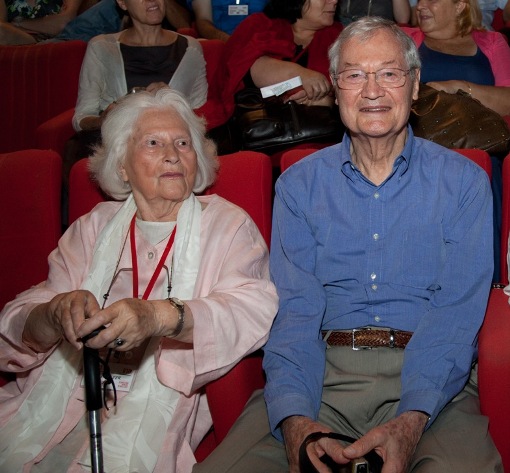
“I went back to the Lakeshore Motel, smoked a couple of doobs, had some Heinekens.
Sat down and began to sign photographs. I came upon one photograph of “The Wild Angels.” So the doobs and the Heinekin kicked right in and I fell into the photograph…That’s it – I know what to do for my next sex, motorcycles and drugs movie!”
Peter Fonda in Easy Rider: Shaking the Cage 1999
Any attempt to describe Robert Corman and his contribution to film invites hyperbole and contradiction. Guest of honor at the 13th International Student Film Festival which took place June 5 – 12, 2010 at the Tel Aviv Cinematheque, he holds a degree in Literature from Balliol College, Oxford, a degree in Engineering from Standford University, has been called the “King of the B Movies” for making hundreds of low-budget films, and received an Academy Award for Lifetime Achievement in 2009.
Not interested in B movies? Tempted to doubt the artistic interest in someone who published an autobiography titled “How I Made a Hundred Movies in Hollywood and Never Lost a Dime” (1990)? Think again.
Jonathan Demme, Joe Dante, Peter Bogdanovich, Martin Scorcese, Francis Ford Coppola, George Lucas, Ron Howard, Peter Fonda, and Jack Nicolson were all Corman protégés, working in films such as “The Last Woman on Earth” (1960), “Creature From the Haunted Sea” (1961), and “Eat My Dust” (1976). Although most went on to pursue very different directions in film, their first working experiences in film were with Corman, during the years when Hollywood was undergoing a revolution – and Corman was clearly one of the rebels.
In a discussion that took place before the festival screening of “House of Usher” (1960), one of a series of horror films based on stories by Edgar Allan Poe, Corman offered some insight into his perspective and process. Of his part in the Hollywood revolution that took place in the 60s, Corman said, “I was just one of a number of young and independent producer/directors at that time and what we were doing, we were stepping totally away from the studio system. I had been shooting the Edgar Allan Poe pictures entirely in the studio and I switched in the 60s to shooting totally on location. The first picture was the picture with the Hells Angels called “The Wild Angels” (1966) and I shot everything on location in bars and hangout of the Hells Angels and actually hired them to be in the picture which is a story unto itself. But luckily the film turned out well…it was one of the films there were many other films, it was one of the films that started a revolution in Hollywood.”
Successful in its own right, the impact of “The Wild Angels” was tremendous. It not only inspired a new genre of biker films that continued through the 70s, and provided the Scottish alternative rock group Primal Scream with their first major hit “Loaded” in1990, but was Peter Fonda’s inspiration for the film that became synonymous with 60s counterculture: “Easy Rider” (1969). Beyond the obvious similarities between the two films, Fonda’s description of the process in the documentary “Easy Rider: Shaking the Cage” (1999) offers additional insight into the way that Corman and his methods offered a different perspective on making films that opened up new possibilities for young filmmakers.
Fonda recalls his first meeting pitching the idea to producers Bob Rafelson and Burt Schneider. When asked by Rafelson, “How much do you want for this movie?” Fonda answered, “$360,000.” Explaining his response in the documentary, “I wasn’t prepared for it [the question of costs], I just thought: that’s how much it cost Corman to shoot “The Wild Angels,” I can do the same, no problem.” If nothing else, Corman showed them that it can be done.
Yet perhaps more significant is that Corman showed that it can be done differently, that it is possible to go your own way and succeed. Reflecting on Corman’s career it is somewhat difficult to reconcile the importer and distributor of Ingmar Bergman’s “Cries and Whispers” (1972) with the creator of “Bucket of Blood” (1959). Yet hearing him speak about his work, one approaches a better understanding of his aims and priorities.
Corman, who was born in 1926, explained the evolution of his film career, saying, “My father was an engineer. I started out to be an engineer at the university to follow in his footsteps. I actually have a degree in engineering but I became a film critic for my university, Stanford. I started as a film critic for the Stanford Daily – so that took me away from engineering and I began to be interested in film…Well, I started as a writer, then became a writer/producer, then became a writer/producer/director for most of my work. [I was] most active as producer/director and that was the position I preferred because both the producer and the director have the most total control as you can have in a film…One of the reasons I continue making low budget films – I finance the films myself and I therefore have control and they have to be low budget because I don’t have that much money.”
Later, Corman went on to say, “I think one of the reasons that I was able to make so many films on a fairly low budget and still maintain a certain level of quality is the fact that I do have a degree in Engineering and that my degree in Engineering taught me certain ways to think, to plan, to prepare, so that I was able to work more efficiently as a filmmaker.”

Corman, who according to his own report has made 350 films, was asked the inevitable: “How do you do it?” He replied: “I love the process of making motion pictures and I worked extremely hard. I remember one time in the 1960s I was shooting a picture during the day, casting my next picture during my lunch hour and cutting the previous picture at night. I remember one night I went to bed, I only had a few hours and I said to myself: I have to sleep fast!”
There is clearly a great deal for aspiring filmmakers to learn from Corman, who taught a Master Class at the festival on his work and cinematic vision, and the eulogy spoken by Heavenly Blues at the Loser’s funeral in “The Wild Angels” (sampled by Primal Scream and other bands) is certainly inspirational:
We want to be free! We want to be free to do what we want to do! We want to be free to ride. And we want to be free to ride our machines without being hassled by The Man. And we want to get loaded. And we want to have a good time! And that’s what we’re gonna do. We’re gonna have a good time. We’re gonna have a party!






Comments are closed.